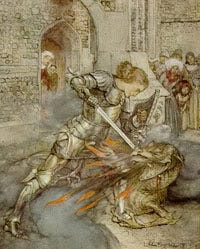The Necessity of Chivalry - CS Lewis

The word chivalry has meant at different times a good many different things – from heavy cavalry to giving a woman a seat in a train. But if we want to understand chivalry as an ideal distinct from other ideals – if we want to isolate that particular conception of the man comme il faut which was the special contribution of the Middle Ages to our culture – we cannot do better than turn to the words addressed to the greatest of all the imaginary knights in Malory's Morte D'Arthur. ‘Thou wert the meekest man’, says Sir Ector to the dead Launcelot. ‘Thou were the meekest man that ever ate in hall among ladies; and thou were the sternest knight to thy mortal foe that ever put spear in the rest.’*
The important thing about this ideal is, of course, the double demand it makes on human nature. The knight is a man of blood and iron, a man familiar with the sight of smashed faces and the ragged stumps of lopped-off limbs; he is also a demure, almost a maidenlike, guest in hall, a gentle, modest, unobtrusive man. He is not a compromise or happy mean between ferocity and meekness; he is fierce to the nth and meek to the nth. When Launcelot heard himself pronounced the best knight in the world, ‘he wept as he had been a child that had been beaten.’**
What, you may ask, is the relevance of this ideal to the modern world? It is terribly relevant. It may or may not be practicable – the Middle Ages notoriously failed to obey it – but it is certainly practical; practical as the fact that men in a desert must find water or die.
...
The medieval ideal brought together two things which have no natural tendency to gravitate towards one another. It brought them together for that very reason. It taught humility and forbearance to the great warrior because everyone knew by experience how much he usually needed that lesson. It demanded valour of the urbane and modest man because everyone knew that he was as likely as not to be a milksop.
In so doing, the Middle Ages fixed on the one hope of the world. It may or may not be possible to produce by the thousand men who combine the two sides of Launcelot's character. But if it is not possible, then all talk of any lasting happiness or dignity in human society is pure moonshine.
If we cannot produce Launcelots, humanity falls into two sections – those who can deal in blood and iron but cannot be ‘meek in hall’, and those who are ‘meek in hall’ but useless in battle – for the third class, who are both brutal in peace and cowardly in war, need not here be discussed. When this disassociation of the two halves of Launcelot occurs, history becomes a horribly simple affair.
...
In short, there is still life in the tradition which the Middle Ages inaugurated. But the maintenance of that life depends, in part, on knowing that the knightly character is art not nature – something that needs to be achieved, not something that can be relied upon to happen.
...
The ideal embodied in Launcelot is ‘escapism’ in a sense never dreamed of by those who use that word; it offers the only possible escape from a world divided between wolves who do not understand, and sheep who cannot defend, the things which make life desirable.
* Sir Thomas Malory, Le Morte D'Arthur (1485), XXI, xii
Ibid., XIX, v.
**
- C.S. Lewis,
Essay Collection: Literature, Philosophy and Short Stories, "The Necessity of Chivalry".
Note: It always pays to google before typing something yourself, so I stole much of the typing of this essay, and the picture, from here.

